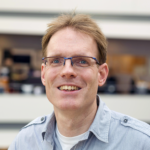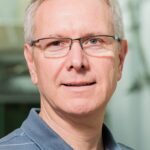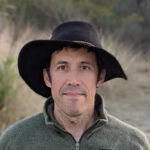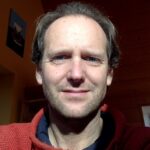GENETICS is pleased to announce five new Associate Editors have joined the Editorial Board.
Cellular Genetics
Mike Boxem
Utrecht University

Mike Boxem studies the polarization and organization of epithelial cells using C. elegans as an animal model. He received his training in genetics and developmental biology as a PhD student, working on the control of cell division in C. elegans in the group of Sander van den Heuvel. As a postdoc in the group of Marc Vidal, he focused on high-throughput mapping of C. elegans protein–protein interaction networks. He started his own group in 2008 at Utrecht University, where he is currently a full professor. In his work he combines systems biology approaches, experimental manipulation, and live-cell imaging to study epithelial cell polarity. He has a keen interest in the development and application of novel technologies that aid him in these efforts.
James Kronstad
The University of British Columbia

James Kronstad joined the faculty at the University of British Columbia in 1989 and is currently a Professor in the Michael Smith Laboratories (MSL) and the Department of Microbiology and Immunology. He served as Director of the MSL from 2008 to 2017, and he is currently a fellow in the CIFAR program: Fungal Kingdom, Threats & Opportunities. Research in the Kronstad lab focuses on defining mechanisms of pathogenesis for fungal pathogens that threaten human health either directly as agents of infectious diseases or as plant pathogens that challenge crop production. One area of investigation centers on AIDS-associated pathogen Cryptococcus neoformans, with an emphasis on regulation of virulence factor deployment in response to host conditions such as iron deprivation. In parallel, efforts are underway to identify mechanisms of nutrient sensing that support biotrophic development of the maize pathogen Ustilago maydis in host tissue.
Statistical Genetics & Genomics
Jian Yang
Westlake University

Jian Yang received his PhD in 2008 from Zhejiang University, China, before undertaking postdoctoral research at the QIMR Berghofer Medical Research Institute in Australia. He joined The University of Queensland, Australia, in 2012 and moved to Westlake University, China, in 2020. His primary research interests are focused on understanding the genomic variations among individuals within and between populations and the links of DNA variations and modifications to phenotypes and diseases. He was the 2012 recipient of the Centenary Institute Lawrence Creative Prize, in recognition of his contribution to solving the ‘missing heritability’ paradox. He was awarded the Australian Academy of Science Ruth Stephens Gani Medal for distinguished research in human genetics (2015) and the Prime Minister’s Prize for Sciences – Frank Fenner Prize for Life Scientist of the Year (2017). He was named in the Clarivate Highly Cited Researchers from 2018 to 2021.
Theoretical Population and Evolutionary Genetics
Peter Ralph
University of Oregon

Peter Ralph works on theoretical and empirical questions in population genetics and evolution, with a focus on how geography affects adaptation, and how we can inform inferences of spatial demography with genomic data. He is an associate professor in the Institute of Ecology and Evolution at the University of Oregon, in the Mathematics and Biology departments, and is a core developer in several community-driven efforts to improve software tools for population genomics, including the tsKit group and the PopSim consortium.
Denis Roze
Station Biologique de Roscoff – CNRS

Denis Roze is a population geneticist working on interactions among genes and their consequences on the evolution of reproductive systems and genetic architecture: evolution of sex and mating systems, life cycles, recombination and mutation rates. He explores these issues using a variety of theoretical approaches, ranging from 2 or 3-locus models to evolutionary quantitative genetics. After having graduated in Paris, he has worked at the Universities of Arizona, Montpellier and Edinburgh, and currently holds a CNRS position at Roscoff’s Biological Station (France).













